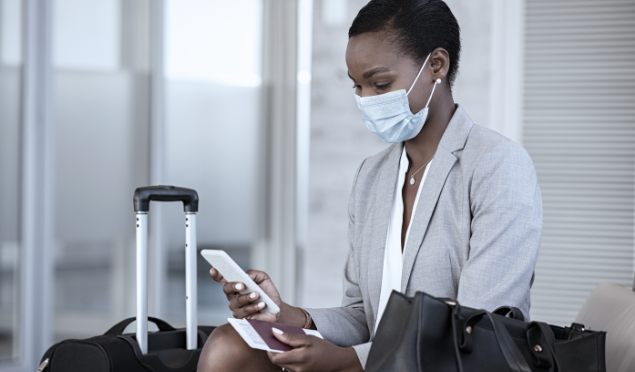What happens if you get sick abroad?

Last updated on 5th January, 2024 at 01:51 pm
Planning a trip abroad post-COVID-19? Accidents and illness do happen, so make sure you’re covered. Here’s why (and how).
When you’re sitting at your desk fantasising about that skiing trip you’ve pretty much been saving for your entire life, you don’t picture breaking your wrist. Or perhaps it’s an exotic beach holiday you had in mind – but not a nasty stomach bug that can get picked up in remote places. The truth is, life doesn’t always work out the way you planned, and from what we’ve seen with the COVID-19 pandemic, you can get sick, and you can get very sick while abroad. So what should you do if that happens?
If your trip is cancelled, you lose luggage, or you miss a connecting flight
According to medical insurer Fedhealth, if you fall ill overseas and need to come home for further treatment and you’re given the all-clear to travel, “the insurance pays for your return trip to South Africa. However, if you choose to continue your holiday and need further treatment, the costs will have to come out of your own pocket”. A travel insurance policy could provide emergency medical cover only, or include cover for other travel risks such as cancellation cover and luggage cover.
Before you board a plane, make sure you do so with peace of mind. Travel insurance covers you for emergency medical and related expenses up to the limit in your schedule if you contract COVID-19 while you are travelling. To activate the cover, you’ll need to notify your insurance provider immediately using the 24-hour emergency assistance contact on your policy. Costs or losses incurred owing to travel disruptions as a result of the pandemic are not covered on your medical aid travel insurance policy.
If you end up in hospital, or rack up doctor’s bills
Many medical aids offer cover for you and your dependants through a travel insurance option linked to your plan. It’s important, however, to check and then double-check that your particular option has this benefit. Most have a time limit to the cover of 45 days from the date you exit South Africa, so it’s also best to advise your scheme that you’re travelling abroad before you leave. If you’re stuck somewhere for longer than 45 days due to a pandemic like COVID-19 that may ground all travel, you could extend your medical aid travel insurance policy provided you contact your broker before your policy expires.
Check that the country or region you’re travelling to is covered – some high-risk areas will be excluded. Pre-existing conditions including anything you’ve been treated for in the six months prior to your trip won’t be covered. These exclusions often include “a condition that you know may require treatment while you’re overseas; if you’ve been advised by a medical practitioner not to travel; or you have a terminal prognosis,” according to Fedhealth.
While immediate medical emergency treatment, including doctor and hospital bills, in- and out-patient care and medical transport is generally covered, as already stated, most travel insurance companies won’t cover you if you decide to embark on a high-risk activity. Examples are sports undertaken for leisure purposes such as snow skiing, water skiing and scuba diving. You can – and probably should – take out special cover for these kinds of activities if you’re planning to enjoy them while on your trip.
If you need to be evacuated, or someone dies overseas
The Department of International Relations and Cooperation (DIRCO) strongly recommends taking out travel insurance before travelling abroad. “Travel insurance should cover hospitalisation and related medical costs, as well as a possible emergency evacuation. Depending on your age, physical condition and destination, consider provision in the event of death.” DIRCO points out that medical costs abroad can be expensive compared to South Africa, and in some instances, medical treatment can be withheld by the foreign country if a person has no proof of funds or travel insurance.
“It is for this reason that travel insurance that covers expenses in the event of death abroad will ensure that loved ones are not burdened with the costs of the preparation and transportation of mortal remains to South Africa, and it’s important to cover all the members of the travelling party adequately. In the event the deceased had travel insurance, it’s recommended that the insurer be contacted first to establish whether the deceased is covered in case of death. The South African government does not render any financial assistance pertaining to the death of South African citizens abroad,” states DIRCO.
Good to know
• Travel insurance must be obtained before you embark on your journey; you can’t take out a policy once you’ve departed.
• Travel Insurance Consultants (TIC) published findings that 50% of medical claims are as a result of an accident. The most important benefit on a travel insurance policy is the medical benefit.
• If you’re more than 24 weeks pregnant, most insurance companies won’t pay for claims related to the pregnancy or childbirth while you are travelling. They also won’t cover the medical expenses for a baby born outside South African borders.
• There will be age restrictions on any travel insurance plan – especially if you have a pre-existing condition. Find out what these terms and conditions are before you embark on your holiday.
• Make sure that you’re familiar with the health risks of the country or countries you intend to visit. Get all the recommended vaccinations and/or medication before travelling. If you need to travel with medication, ensure that it meets the requirements of your destination(s). Take your prescription along.
Want to learn more?
We send out regular emails packed with useful advice, ideas and tips on everything from saving and investing to budgeting and tax. If you're a Sanlam Reality member and not receiving these emails, update your contact details now.
Update Now







